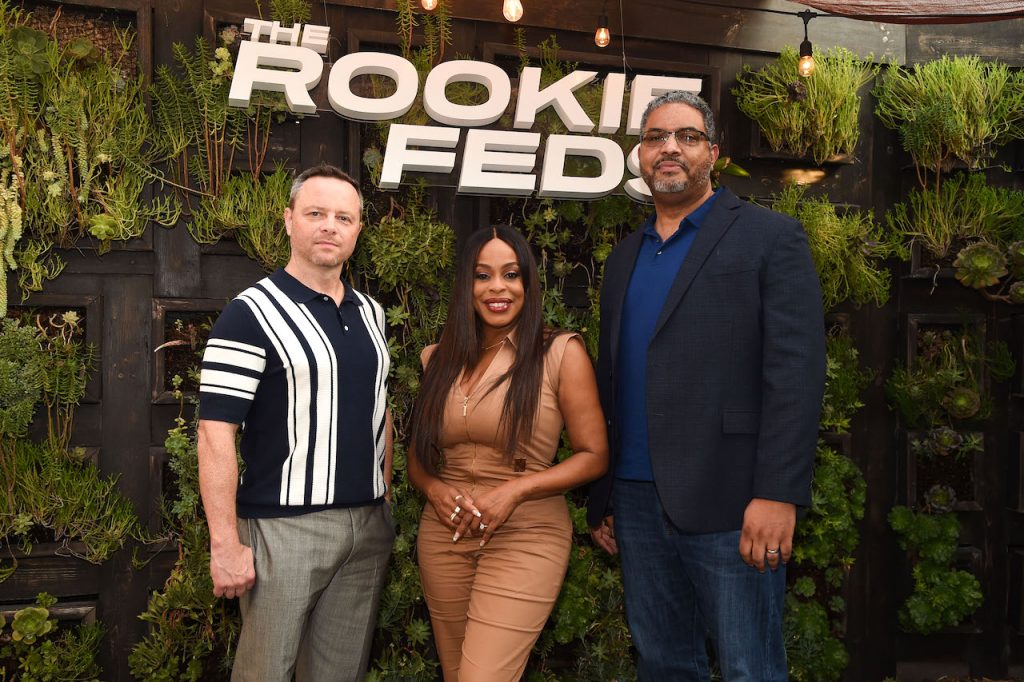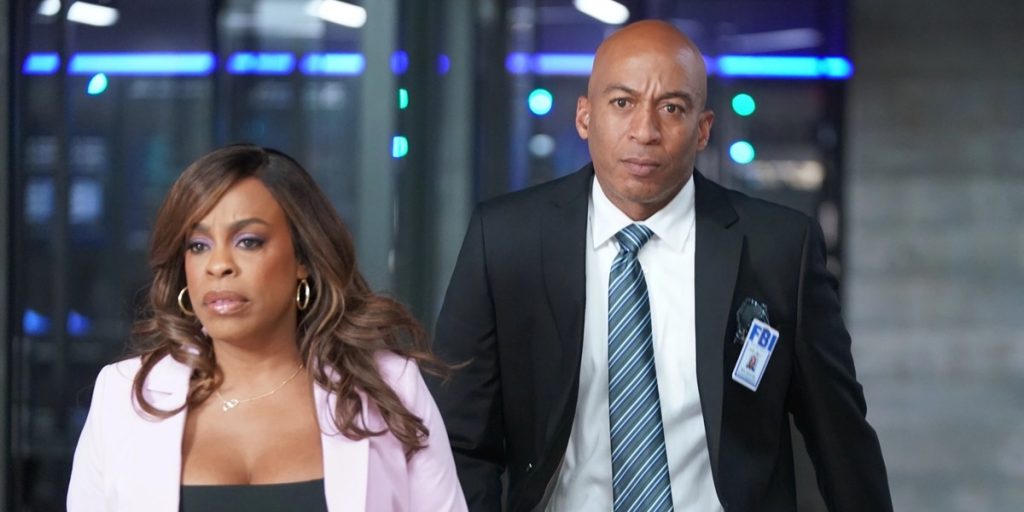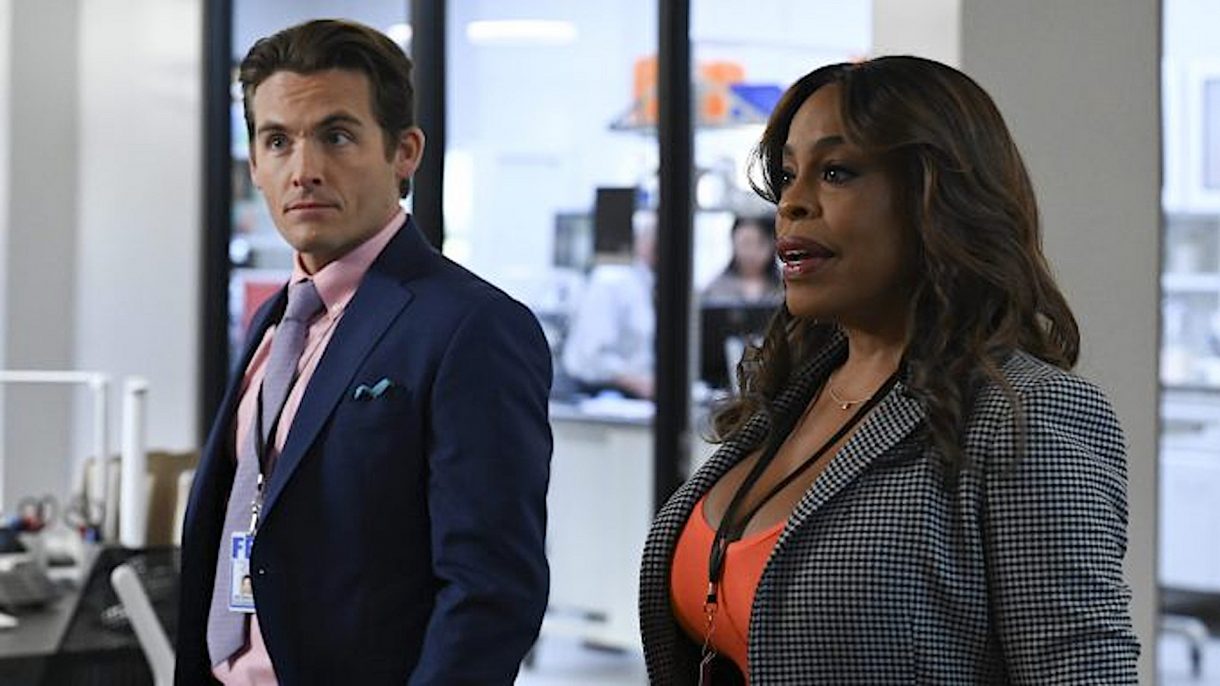Cop shows are perennial favorites. From the BBC’s Telecrime (1938-1939) to The Untouchables (1959-1963) to Law & Order (1990- ), audiences love to play armchair detective. Some shows focus on detectives, some on court room proceedings, some on cops on the beat. No matter the subgenre of crime show, it’s always the characters that endear watchers.
ABC’s The Rookie (2018), starring Nathan Fillion and Alyssa Diaz, is the creation of Alexi Hawley and Terence Paul Winter. Veteran writer Alexi got his start writing features, but has found his niche penning and showrunning television. His colleague and friend began as an actor but found his calling in writing. Their latest creation is The Rookie: Feds: which stars Niecy Nash and follows the exploits of Black female special agent Simone Clark.
Alexi and Terence spoke with Creative Screenwriting Magazine about The Rookie: Feds and working in television.
How did you come up with the concept for The Rookie: Feds?
Alexi: The Rookie was in Season 4, and it seemed to me to be the right time to approach a spin-off. Grey’s Anatomy and Station 19 were really the only connected shows ABC had. Those kinds of shows are the staple of NBC, CBS, and Fox. It seemed like the right time to ask if they were ready to bridge that gap and they were. Then it became a question of how to proceed.
Terence and I had worked together on Castle back in the day. I was there for three seasons early on. Terence was there from day one to when we turned the lights out. When I got The Rookie going, he came over to be my number two over here. Once ABC said let’s go on the spin-off, I couldn’t think of anyone better to create it with and co-showrun it with.
Did you have to pitch the idea of the show?
Alexi: Yes, it was a bit of a long process. Obviously, it started out with a two-episode embedded pilot in Rookie Season 4, so we had to pitch a character, the story, the two-parter. Once they liked that, we had to pitch a version of what it would be in series.
How much research did you have to do for the show?
Terence: We did a fair amount. We talked to many former and current FBI agents. I read as many books as I could on the FBI trying to get little insights here and there. That’s where all the specificity came for a lot of things we put in the show.
In addition, just piggybacking what Alexi was just talking about, as soon as we had the concept of this being the FBI in Los Angeles, which is in the same direct universe as the flagship series, it was about defining this character. When we created this character of Simone Clark and got Niecy Nash-Betts to agree to do it, that’s when it all started to come together.

Alexi Hawley, Niece Nash-Betts, Terence Paul Winter. Photo by Frank Micelotta/ ABC
Did you come across any research you found intriguing?
Terence: There’s a lot, but I read this one woman’s book and a statistic jumped out that black women make up less than 1% of special agents in the FBI. I highlighted it and told Alexi that I thought this would be the seed of what this story wants to be. This agency that’s been around for so long, since the days of J. Edgar Hoover to now, for the good and the bad, to be at still less than 1% What’s that about? That’s something worth exploring, there’s a story there.
What are the pressures and challenges of doing a show that’s in the first season compared to a show that’s been on for several seasons?
Alexi: Every first-year show is putting together several hundred unknowns to a certain extent and seeing how it goes. We got lucky because we stacked the deck a little bit. We brought on a line producer who we worked with on Castle. We brought on a producing director who’d worked with us on The Rookie a bunch. Wherever we could, we brought on family so that it made it easier. Even so, your budgets are never big enough. You’re just learning how to make the show. It’s learning how the show works, navigating personalities, and trying to put together a team that everyone wants to spend time with. We’ve done that.
Terence: Alexi and I have done several first season shows. It’s always a challenge because of the unknowns. It all seems great on paper when we’re dreaming it up. Once you get hundreds of people on stage and the scenes are acted out, the show will tell you what it wants to be.
What’s an average day in the writers room like?
Alexi: There’s no such thing, especially in the time of COVID. When Terence and I were on staff, we’d start at 10:00 a.m., break for lunch, then be there until around 6:00 p.m. It was never my favorite thing. I came out of features, where I was used to breaking story by myself. I thought the room was very helpful, but to spend all day everyday breaking story… it wasn’t my favorite thing, personally. On The Rookie, it’s two hours in the morning and two to three hours in the afternoon because Zoom is so hard on your eyes and brain. We have a tendency to group write a lot. When you’re doing twenty-two episodes a year, every eight days you need a new script. The room part of it has gotten smaller.
Terence: It depends on what the story is that week. Sometimes it’s easier, sometimes it isn’t. Every once in awhile, you have to do something to mix it up. It’s also good to know when to say let’s take a break.
How did you get your start writing?
Terence: I started out as a half-assed actor. I was going to write my own version of Rocky, but not a boxing movie. I sold it to MGM and thought, ‘Oh, this is really going to happen.’ But as the movie changed and as years went on, I realized I was a writer masquerading as an actor. When that clicked and I was writing specs at the time, about a year later I got my first staff opportunity on a CW sitcom called All of Us, which was created by Will Smith, Jada Pinkett-Smith, and Betsy Borns. That was about nineteen years ago. Then, three years later I got on Castle and met Alexi during Season 2. And like Alexi said, I never left. One of the nice things about my job lately is that I’ve been able to work with friends.
Alexi: After college, I started out playing drums in New York, trying to be a rock star. It didn’t work out. To eat, I took a job at a law firm in New York being a receptionist, then an assistant. I used to sit in front of a computer all day every day, so I started writing as a way to be creative and not go crazy. I started writing feature scripts. I managed to get one to a friend of a friend who was a director who had won Austin and gone to Sundance. He put together staged readings at the former Tiffany Theater out here and at the Atlantic Theater in New York wiith William H. Macy, Juliana Margulies, Giancarlo Esposito. I flew out to L.A. to do them and could not get an agent to come and that blew my mind. Ultimately, we failed to get that movie set up, but I did get an agent out of it. I got a feature optioned, and for the next six or seven years I wrote movie scripts. I still couldn’t move out to L.A. though because I had kids at that point, and I had to feed them. It wasn’t until I booked a bunch of writing assignments back to back to back that we flew to L.A. and moved in. It was about five years later that I got into television, and I’ve been doing that ever since.

Simone Clarke (Niecy Betts-Nash & Carter Hope (James Lesure) Phot Courtney of ABC
Do you prefer feature or television writing?
Alexi: I consider features the abusive partner that I can’t quite leave. The phone rings for a movie assignment and I’m like, ‘Movie!’ They treat you terribly, they don’t get made, and you spend years of your life on them. And yet, movies were my first love. That being said, I much prefer television because you actually make it. This year, between this show and The Rookie, I’m going to make forty-four episodes of television. I also have a show at Netflix called The Recruit. That was eight more episodes. What I love about it, particularly network television, is that every eight days you need a new script. There’s an immediacy to the pace and to the depth of storytelling that you get. We are now shooting our 90th episode of The Rookie. It gives you room to be looser, to focus on things. In a two-hour movie, every word is vital. You just have more fun in television.
What show, besides this one, have you enjoyed working on and why? I’m sure you’ve enjoyed all of them but which one stands out?
Terence: They were all wonderful in their own way. Castle was amazing, I got to be there for 173 episodes. There was more good than bad. I would do anything to repeat that process. It was kind of this wonderful place where I could be supported, learn my craft, and meet lifelong friends.
You two met on that show, right?
Alexi: We’re not still friends, but we met on that show.
Terence: Not him, but there’s other people…! Being there for so long makes it stand out. To be able to grow from staff writer to co-showrunner in seven seasons was a wonderful journey.
Alexi: The best ones are the ones where you do create a family. I get paid to be interested in things for a living. I went from doing Castle, which was a romantic comedy, to doing a serial killer project. I like the challenge of that, the switching of gears.
Do you lean towards a particular genre?
Alexi: I don’t do camp and I don’t do soap. Besides that, I do everything. If you watch the shows I’ve made, you can feel that. We always have stakes. We can be emotional, be action, be horror. The audiences these days are so smart, they love the mashup.
Terence: I’ve been living in the world of cop shows for quite a long time now. It really comes down to characters for me more so than the genre. I have to care about the characters because with television that’s really what it’s all about.
I love when you start a show off with a question and go about trying to get the answer by the end of it. There’s something really exciting and satisfying about that kind of storytelling. You don’t have to answer every question. It’s actually more delicious if you don’t.

